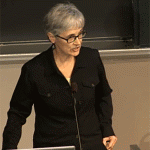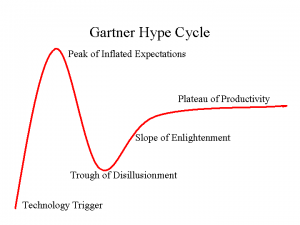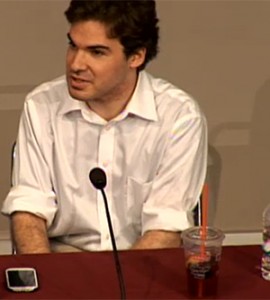Unlocking the Mystery of MOOCs: MIT hosts the LINC 2013 Conference
-
-
slice.mit.edu
Filed Under
Recommended

MITx’s first offer of an online MIT course back in December 2011 received a huge turn-out of almost 155,000 registrants–including a 15-year-old student in Mongolia studying under Tony Kim '09, MEng '11. This fall, that student will attend MIT–but he will have to take the course he just aced, all over again.
That first course—Circuits and Electronics, or 6.002x—became an important talking point for speakers at the sixth annual MIT LINC conference. Educators from schools and universities all over the world came to Cambridge on June 16-19 to discuss how to supplement traditional education programs with online course materials.
Panel topics ranged from the advantages and disadvantages of relying on Massive Open Online Courses (MOOCs), virtual universities, and educational television programming, plus discussion of the general state of technology accessibility and implementation both at MIT and elsewhere.
Throughout the conference, speakers seemed torn between the allure of worldwide accessibility as provided by online courses, versus the value of traditional face-to-face teaching methods.
In the first set of speakers at LINC, former Open University (UK) president Sir John Daniel showed us the Gartner Hype Cycle graph, which describes common reactions to new technologies. Daniel explained that MIT was still in the “peak of inflated expectations” regarding MOOCs. The following day, Dr. Okhwa Lee from Chungbuk National University in South Korea also showed this same graph, explaining that South Korea had already progressed to the “trough of disillusionment.” Both speakers had the same question: how do we get to the “plateau of productivity” when it comes to teaching courses online?
The final day of talks at LINC featured faculty and alumni discussing technology-enabled learning initiatives at MIT, such as BLOSSOMS (Blended Learning Open Source Science or Math Studies), a library of video lessons for high school students, as well as MIT’s OpenCourseWare (OCW) materials. Cecilia d’Oliveira '77, SM '79, the Executive Director of MIT OCW, emphasized her belief that online courses and face-to-face classes should have a “synergistic” relationship at MIT.
Ethan Solomon '12 used his talk to describe a teaching innovation that he believes is entirely new: “addictive green check marks,” used in MOOCs to indicate good work. In the final panel of LINC, Solomon described his love of instant online feedback, closing his talk by declaring the lecture hall that he stood in to be “useless … except for conferences like this.”
Are you a true believer in online courseware? Watch the LINC 2013 panels online to learn more, or try a class yourself at MITx.mit.edu.









